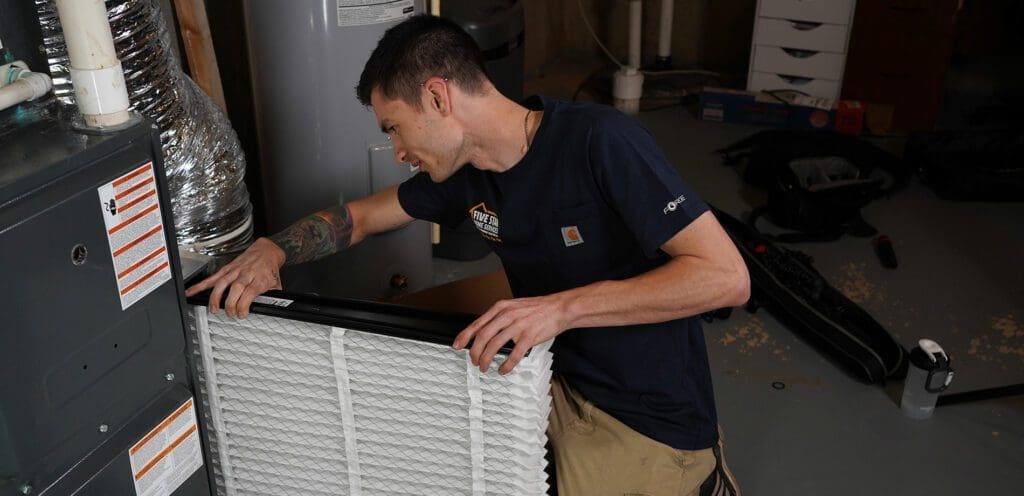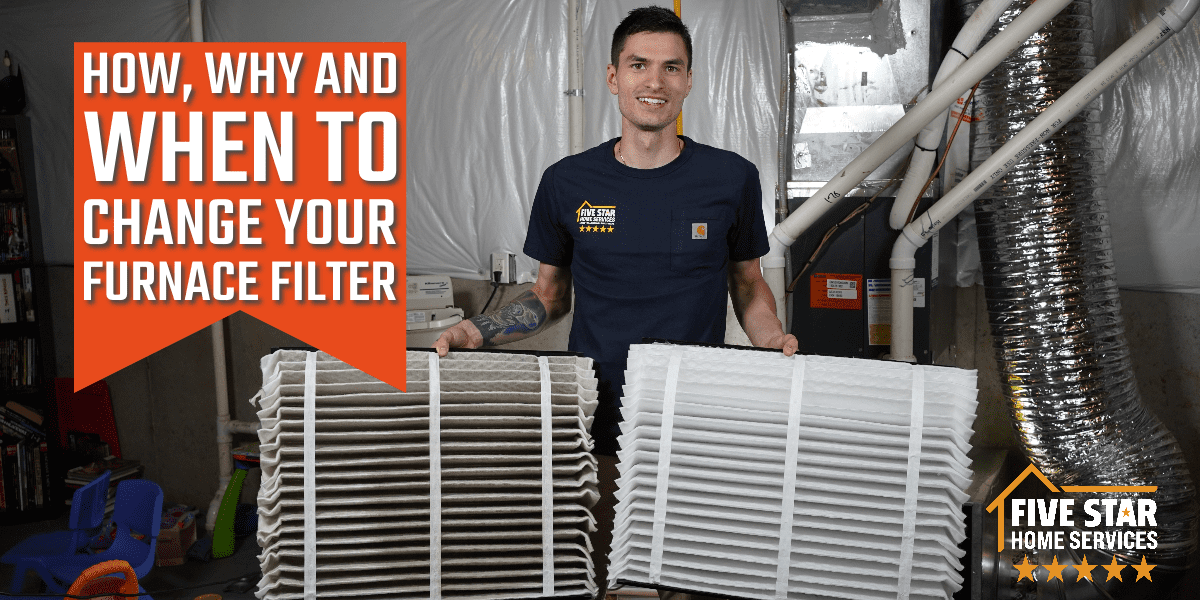Looking to keep your HVAC system operating at peak efficiency? If so, you should make sure to change your furnace filters regularly.
If you own a home comfort system — you have an air filter. That air filter, like all air filters, needs to be replaced on a regular basis.
Unfortunately, however, far too many homeowners let this go too long. When this happens, problems occur. Problems can be expensive. They might not happen right away. However, it’s only a matter of time before they do. Even before those obviously bad things (like your system failing) happen, you’re going to have a far less efficient system that’s going to cost you a lot more in the long run.
So let’s resolve this right away. Your friends at Five Star Home Services are always here to save the day!

Today, we are going to talk you through choosing the right air filter. We will discuss what filter ratings mean. We will cover what you can expect if you don’t change your filter on time. And last but not least, how to take care of your air filter by yourself. With our help, you should have a year-long plan for managing your air filtration in a way that will benefit your home and family the most.
For starters . . .
Your owner’s manual is a good place to start for filtration requirements and limits. However, this manual won’t always provide all the options available to you. Now a lot of people are probably thinking, at this point — a filter is a filter, right? Wrong.
This isn’t always the case. Although it’s true that any old filter will capture some particles traveling through your HVAC system, not all air filters are created equal.
In addition to how many particles an air filter captures, there are other relevant factors to consider as well. Those factors include:
- Size of the filter in relation to your system
- How much of the filter is uncovered by cardboard, plastic, or other materials
- How much (or little) a filter allows for airflow in your system (this is a big one)
Last but not least, a filter’s ability to capture small particulates, which relates to your ability to breathe easily when it comes to allergy and flu season, is also essential.
Filter size is something that we can discuss with you. Your options include store-bought filters or others that your HVAC partner has available to them through various manufacturers.
Filter designs are also important. Some filters are designed with a crisscross pattern of cardboard or other material, which minimizes the surface area of a filter. This can decrease the efficacy of an air filter significantly — even if you’ve upgraded it. Designs definitely matter, which is why cheaper air filters are often cheaper.
In any case, proper airflow in your HVAC system is essential. We will talk more about this later, but it’s a central reason to clean or replace your filters in a timely manner.
Although air filter ratings definitely matter, they are often what get the most attention. To discuss them, we need to look at MERV Ratings.
What is a MERV Rating?
A MERV rating, or Minimum Efficiency Reporting Value, is a measurement scale designed by the American Society of Heating, Refrigerating, and Air-Conditioning Engineers (ASHRAE) to evaluate the efficiency of air filters. The scale ranges from 1 to 16, with the higher numbers indicating a finer filtration level, thus being able to trap smaller particles. This rating helps consumers understand the functionality of their air filters, promoting healthier indoor air quality.
Air filters are essential components of heating, ventilation, and air conditioning (HVAC) systems. They are responsible for removing dust, allergens, and other harmful particles from the air before it is circulated back into indoor spaces. High-efficiency air filters with a high MERV rating can capture even the smallest of particles, including bacteria and viruses.
Proper maintenance of HVAC systems and air filters is crucial to ensure that they continue to function efficiently. Regularly changing air filters can improve the overall air quality indoors, preventing health issues such as allergies and respiratory conditions. It also helps prolong the lifespan of HVAC systems, reducing energy consumption and costs.
In addition to regular filter changes, it is also important to choose the right type of filter based on your specific needs. A higher MERV rating may not always be the best choice, as it can restrict airflow and put strain on the system. It is important to consider factors such as size, type of filter material, and compatibility with your HVAC system when selecting an air filter.
Moreover, proper installation of air filters is essential for optimal functionality.
Why Change Your HVAC Filter?
Although we touched on a handful of reasons earlier, now we will delve deeper into this. Now we want to discuss some of the long-term effects of neglecting your filter. Our service techs will sometimes have to “repair” a system that shuts down completely. It will turn out that the only immediate problem is the air filter. That’s the worst-case scenario. If your air filter gets too backed up it will cause a complete system shutdown. Talk about expensive. Why risk it?
Although there are a lot of intermediate problems that poor filtration can cause that will ultimately lead to costly repairs or full system replacements, there are other issues as well.
One example is static pressure. Now this might sound harmless. Nevertheless, it affects the entirety of your HVAC system. When a filter gets packed with detritus, the air won’t move through it very easily. This creates airflow backups in the system, which in turn makes your system run harder than it would otherwise need to. The downsides of this are myriad.
The Short-term Downsides include:
- Less comfort in your home
- Pockets of hot and cold spots in your home
- Lack of airflow to certain vents
- Longer run times for your furnace or air conditioner
- Higher energy bills as a result of the longer run times
The Long-term Downsides include:
- Areas of high pressure in your ductwork can cause leaks
- Making your HVAC system work harder and more often means that its lifespan will be significantly decreased over a number of years
The reason a lot of this is so insidious is that your HVAC system will probably run for months or years with a clogged filter. Even if you forget about it, you will get at least some heating and air conditioning.
But at what cost? In fact, it will be more expensive, and less comfortable. Your HVAC system will either break down or start to have serious problems years before it would otherwise. All because the air filter needs to be changed. Something that simple, and easy to do. The moral of the story: Replace your filter on time.
When to Replace Your Air Filter
Air filters have a recommended replacement schedule on their packaging. This could be as little as every 30 to 60 days. Or, it could be as long as a year. Because of this, it is highly recommended that you stick to this schedule.
Nevertheless, this schedule is merely a recommendation; it is not a strict rule set in stone. Several factors can (and should) affect how often you replace your filter. These factors include the following:
- Whether you have pets. If you have multiple pets in your home, your air filter will clog more quickly.
- Allergy, asthma, and other illness considerations. If it’s allergy season, or your family has someone who is immunocompromised, you should consider replacing it more often.
- Smokers in the home. If you have a smoker in the household, air filters will collect particulates from this more quickly than in some other homes.
- How often do you run your HVAC system? Air filters are only working when the blower fan is running. This could be for air conditioning or heating. However, if you spend the majority of your summer out of the home, you may be able to leave your filter in for longer than recommended. Conversely, if you’re running the HVAC system almost constantly in a particular season, timely replacements are of course recommended.
- In any case, it’s also important for you to monitor your home. If you are starting to notice strange smells, this can be an issue. Does dust seem to accumulate more quickly than normal? All of these are signs your air filter isn’t working efficiently and requires cleaning or replacement.
How to Change a Furnace Filter
Changing a furnace filter is a straightforward task that can improve the efficiency of your heating system. Here’s a step-by-step guide:
- Turn Off Your Furnace: To ensure your safety, turn off your furnace before you start.
- Locate the Filter: Typically, the furnace filter is located inside the blower compartment. Refer to your furnace manual if you have difficulty finding it.
- Examine the Current Filter: Before you remove the old filter, note the direction of the airflow indicated on it. This will be important when installing the new filter.
- Remove the Old Filter: Slide the old filter out of its slot. Be careful not to dislodge any dust or debris into the furnace system.
- Insert the New Filter: Slide the new filter into the slot, making sure the direction of the airflow matches that of the old filter.
- Turn On Your Furnace: Once the new filter is securely in place, turn your furnace back on. Regularly changing your furnace filter can lower utility bills, prolong the life of your furnace, and improve the air quality in your home
Why Is It Important to Change Your Furnace Filter Regularly?
Changing your furnace filter on a regular basis has several benefits for both your home and your wallet. Here are some reasons why you should make sure to change your furnace filter every few months:
- Improved Air Quality: Furnace filters play an important role in keeping the air in your home clean. As they trap dust, pollen, and other particles, they prevent them from circulating throughout your home. This can be particularly beneficial for individuals with allergies or respiratory issues.
- Increased Energy Efficiency: A dirty or clogged furnace filter can restrict air flow, causing your furnace to work harder than necessary. This not only leads to higher energy bills but also puts unnecessary strain on your heating system.
- Prolonged Furnace Life: A well-maintained furnace can last up to 20 years, but neglecting to change the filter can significantly decrease its lifespan. By regularly changing your furnace filter, you reduce the strain on your furnace and help it run more efficiently.
- Cost Savings: Regularly changing your furnace filter can save you money in multiple ways. By improving energy efficiency, you can lower your utility bills. By prolonging the life of your furnace, you avoid costly repairs or replacements.
System Maintenance & Filters
Although replacing the air filters on your furnace can be a fairly straightforward do-it-yourself task, a lot of homeowners forget to perform it on a regular basis. And, likewise, a lot of homeowners pay for it!
Because of this, we like to make a simple suggestion: Tie your air filter changes to your maintenance visits from an HVAC professional. If you have a full HVAC system (air conditioner or heat pump, with a furnace) you should be having them serviced at least once a year. Usually, it makes the most sense to schedule visits approximately 6 months apart: one for air conditioning equipment and one for heating equipment.
Any HVAC company worth its salt will be able to change out your filter as part of the routine maintenance process. The only drawback is if you have a cheaper air filter that needs to be replaced every 30 to 60 days — this is part of the reason we recommend the four-inch media filters that are designed to promote airflow; they usually have higher MERV ratings than entry-level filters, and generally, last about six months, which is great
Regardless, your HVAC tune-ups are a great time to handle this.
And who better to handle your tune-up and preventative maintenance than Five Star Home Services?
Need Additional Help?
If you need additional help, you’re in the right place. Call your friends at Five Star Home Services today at (833) 405-8009.
We are always standing by, ready to come over and help. We want you to Experience the Difference yourself!

